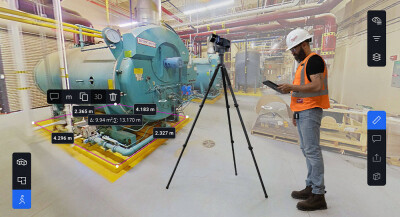A few months ago, when we saw Magic Leap coming out of stealth and announcing the long-awaited AR headset, we only knew Rolling Stone’s opinion, and that it would ship with an expensive price tag somewhere in 2018. However, as we get deeper into 2018, Magic Leap is starting to release a few details about its Lightware AR headset.
To start with, earlier this month at the Code Media conference, Magic Leap CEO Rony Abovitz made an appearance together with NBA Commissioner Adam Silver. This isn’t that surprising, as in the past few years NBA has been working on bringing live games into your home through VR – they even have a VR dedicated page. This partnership with the NBA means Magic Leap’s Augmented Reality headset (or “spatial computing” as Abovitz calls it) will allow you to place virtual screens around the environment and watch classic NBA games or highlights.
As to how much the product might cost, Abovitz didn’t provide specific numbers other than the Magic Leap One coming out later this year is equivalent to “a premium computer”. Additionally, he confirmed this won’t be Magic Leap’s only product as the Magic Leap One is the middle-term, and the company will develop higher-end, as well as lower-end products for enterprise and “wide-mass market”, respectively.
“High-end mobile phone to high-end tablet zone is probably our floor,” Abovitz answered when asked how much the wide-mass market product would cost, and didn’t object when compared to the $1000 iPhone X.
Furthermore, after an awkward silence from Abovitz when asked if 2018 is still the target year for the Magic Leap One’s release, NBA Commissioner Adam Silver stepped in and confirmed it. Shouldn’t it have been a straightforward answer after the company’s announcement back in December?
Additionally, and unfortunately, Abovitz response as to whether VR, AR or “Spatial Computing” will become more of an enterprise product than a consumer one in the future—and coming to stage to discuss the product with an entertainment sports company (NBA)—leaves me thinking Magic Leap isn’t focusing too much on the commercial/industrial markets.
“It’s totally about the experience,” Abovitz said. “So, think of what we’re doing as: people want an amazing visual sonic experience where putting that on versus driving for two hours in traffic, and spending hundreds of dollars to go do something else, is now digitally brought to my home. The convenience factor at some point will be kind of amazing, relative to what you need to do to get that same experience any other way.”
As to what the future holds, we will find out more in Spring 2018, which is when Abovitz said the company will release more information about the product.




.jpg.small.400x400.jpg)

